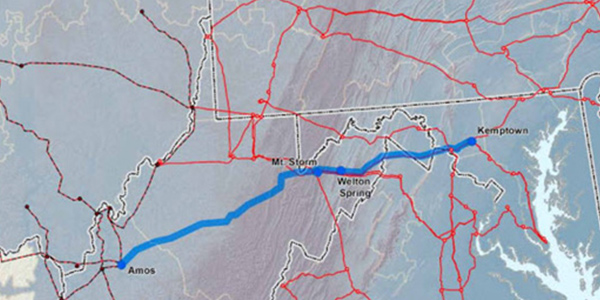By Christen Smith
FERC said last week its revised interpretation of accounting rules supports a rehearing request from developers of the abandoned Potomac-Appalachian Transmission Highline (PATH) transmission project, who are seeking recovery of $6.2 million spent on advertising, education and outreach (ER09-1256-03).
The ruling overturns, in part, FERC’s 2017 decision denying American Electric Power and FirstEnergy subsidiary Allegheny Energy recovery of costs the commission had categorized as lobbying and advertising expenses. (See FERC Orders Tx Refunds, Investigates Pipeline Rates in PJM.)
The $2.1 billion, 765-kV “coal by wire” PATH project was approved by PJM in 2007 to run from AEP’s John Amos coal generator in St. Albans, W.Va., to New Market in Frederick County, Md.
By 2011, however, PJM said the need for the line had moved several years beyond 2015 because of reduced load growth following the Great Recession. After ordering transmission owners to suspend work on the line pending a more complete analysis of all upgrades in its regional transmission plan, the PJM Board of Managers terminated it in 2012. PATH developers pursued cost recovery on the abandoned project totaling $121.5 million.
In 2012, two opponents from West Virginia filed a pro se intervention challenging the companies’ request for recovery of the lobbying and advertising campaigns that were intended to win political support for the project. FERC supported most of an initial decision by Administrative Law Judge Philip C. Baten, who found “that all of PATH’s expenditures were directed at obtaining a public convenience and necessity determination.”
FERC’s 2017 order directed AEP and FirstEnergy to refund ratepayers more than $7 million for the canceled project. The commission also found that PATH’s base return on equity should be reduced from 10.4% to 8.11% and disallowed recovery of $1.1 million in expenses booked into a wrong account.
But the commission said Thursday that, upon further reconsideration, efforts to obtain a certificate of public convenience and necessity “do not fall within the ambit of referenda, legislation, ordinances, the grant of franchise and the like because PATH’s efforts were in service of an RTO-approved project.”
“We find that general promotional efforts on behalf of an already approved project to obtain a finding of a public convenience and necessity are not the type of political activity included in the first clause of the regulation,” FERC said, referring to the rules governing which accounts developers can use for certain types of expenses.
In granting the rehearing, the PATH developers must recalculate the project’s total revenue requirement and account for refunds paid during the interim, FERC said.
The commission denied rehearing on PATH’s reduced ROE but ordered the developers to submit supplemental briefs and additional written evidence regarding how FERC’s proposed revised ROE methodology would apply to the proceeding. The methodology — replacing the discounted cash flow model with one that gives equal weight to the DCF and three other techniques — was developed after the D.C. Circuit Court of Appeals determined the commission’s existing formula was unjust and unreasonable. (See FERC Changing ROE Rules; Higher Rates Likely.)




